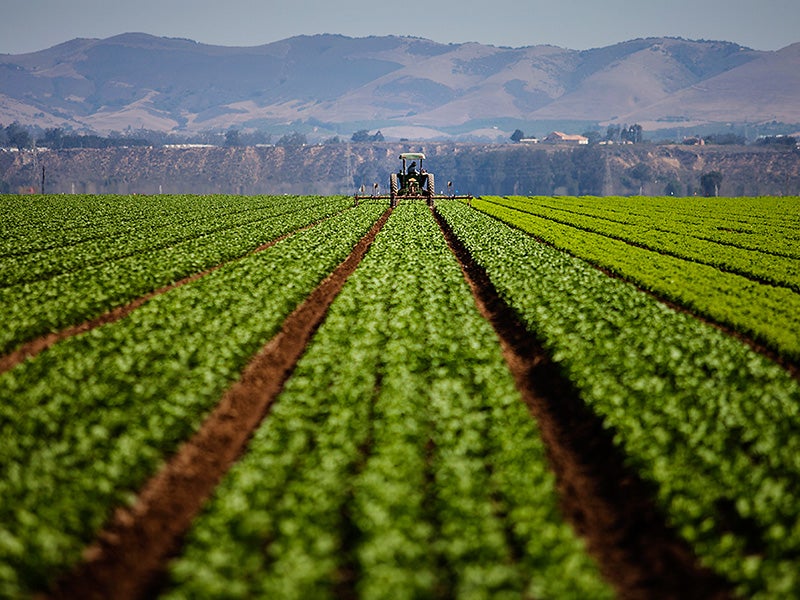Harvesting Equality: Addressing Historical Injustices to Foster a Resilient Agricultural Future
Black farmers resiliently confront legacies of bias amid contemporary climate challenges.
Today there are about 40,000 Black farmers in the United States, making up less than 2% of all U.S. farmers. These numbers are in stark contrast to 1910 where over 900,000 Black farmers operated 1 of every 7 farms. Why the dramatic decrease? Since 1910, a historic legacy of discrimination from the U.S. Department of Agriculture and agricultural policies has denied countless opportunities for Black farmers to accumulate wealth. The result is that Black farmers only bring in half the income of their White counterparts. In addition to financial issues, Black farmers also must contend with threats of further land loss from ongoing and historical challenges as well as climate impacts. As we look to farmers and the agriculture industry to help us meet our climate goals, we cannot prepare for a just and resilient future without a reckoning of our past. Lawmakers should prioritize opportunities to address policies that have continuously blocked Black farming communities from stewarding and thriving from their land.
Remedying Discriminatory Land Practices and Policies Leading to Land Loss
After meeting with 20 Black pastors on January 16, 1865, General William T. Sherman signed Field Order 15 which would reserve 400,000 acres of confederate land to the formerly enslaved population, totaling 40 acres per family. Known colloquially as the promise of “40 acres and a mule”, researchers estimate the present day value of Sherman’s promise to be $2.6 trillion. The promise was ultimately broken by President Andrew Johnson, President Lincoln’s successor and a former Southern slave owner, when he rescinded the order and vetoed legislation that would have offered compensation to former slaves. With this and other acts, policymakers prevented Black farmers from making economic and political progress during Reconstruction. These racist policies forced Black farmers into sharecropping, a form of indentured servitude structured to keep Black farmers in poverty while simultaneously enriching white former slave-holding farmers. Many years later this discrimination persisted, and Black farmers were excluded from New Deal programs and other federal investments. Barred from these critical resources, many were coerced into leaving their land, totaling another $326 billion dollars in lost value. This large-scale land loss, whose impacts are felt today, is seen as a culmination of false promises of land ownership and purposeful exclusion from resources that have forced too many Black farmers out of their homes and livelihoods.
For decades, a policy known as heirs’ property, which allows land to be inherited through family members without legal documentation, has resulted in a startling number of Black farmers losing their land. Without clear titles, these properties often lack farm numbers which are critical to participating in USDA programs and accessing Farm Service Agency loan opportunities, conservation assistance, and crop insurance. Additionally, the legal complexity of inheriting land without documentation makes the properties especially vulnerable to predatory buyers who routinely offer below market prices. Today, as much as 40% of Black farmland is considered an heirs’ property, and according to the USDA, it is the leading cause of Black involuntary land loss. Lawmakers and the USDA can take action to prevent these harms to Black farmers by simplifying and streamlining the process to obtain a farm number, providing funding directly to heirs’ properties, and funding organizations that provide mediation for legal disputes involving heirs’ properties. Bills such as Senator Cory Booker’s Justice for Black Farmers, which protects Black farmers from losing their land and provides land grants to create a new generation of Black farmers, is just one of the many opportunities available to truly ground agriculture policy in justice.
Honoring Black Farmers and Tackling the Climate Crisis
But it’s not enough to remedy the past. We need new investments to better prepare Black farmers for the future — especially with the worsening impacts of climate change. The contributions and historical knowledge of Black farmers to agriculture are part of an incredible legacy, and we must also ensure that this knowledge and those contributions are part of our climate solutions. Prioritizing funding towards climate research at minority serving institutions honors and builds upon this legacy of expertise. One of the ways lawmakers can prioritize funding for all farmers to access conservation programs and assistance, ensuring that our nation’s producers are supported sustainably in the long-term. One of the ways lawmakers can do this is to sufficiently fund the 1890 Land Grant Institutions. These 19 Historically Black Colleges and Universities (HBCUs) have been chronically short-changed and underfunded by state matching programs losing an estimated $90 million in the past five years due to federal policies around state matching funds, while some states continue funding similar programs at predominantly white land grant institutions. Resolving these funding disparities will acknowledge their historical contributions to agriculture while investing in the research, training, and development to ensure future generations of Black farmers are fortified and supported amidst extreme weather, drought, and issues of climate resilience.
The failure of General Sherman’s Field Order 15 is just one snapshot in a long history of exploitation of Black farm labor. The outcome of policies that barred Black farmers from wealth accumulation, while exploiting their labor to enhance White wealth compounded to further enlarge disparities over multiple generations and into the present day. The history of Black farmers is one of endurance in the face of broken promises, a ripple effect from the revocation of ‘40 acres and a mule’ that has real impacts today. As large disparities continue to persist between Black farmers and their counterparts, the immense historical contributions of Black farmers to the nation’s agrarian roots are indisputable and must be honored and upheld by lawmakers and USDA.
Established in 1989, Earthjustice's Policy & Legislation team works with champions in Congress to craft legislation that supports and extends our legal gains.
Geoffrey Nolan
Public Affairs and Communications Officer, Earthjustice
gnolan@earthjustice.org
